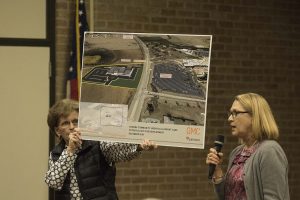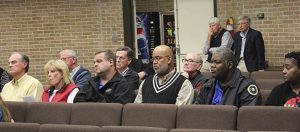

By DON FLETCHER
News Staff Writer
The December 18 public hearing on a proposed new hospital for Atmore went just about as expected.
City and county healthcare officials reinforced their point that the new facility should be built near Interstate 65, and there was little dissent among the members of the general public who attended.
More than 50 people, the majority of them Atmore Community Hospital officials or employees, were on hand for the hearing, which took place in the Atmore City Hall auditorium.
Will Ruzic, executive director of the five-county Coastal Gateway Regional Economic Development Alliance, served as moderator for the hearing.
“This is obviously a very important topic, and we want to make sure we get as much information out there as we can,” Ruzic said before yielding the floor to Atmore Community Hospital Board Chair Nancy Lowrey. “When we fight for our rural areas, we’re fighting for quality of life. That’s what we sell; that’s what we promote.
“I think we all understand the challenges rural areas face in healthcare; hospitals are closing every day. Kudos to Atmore and Escambia County for realizing this years ago and figuring out a way they can address that. This is about transparency, why these decisions are being made and the information, the logic, behind those decisions.”
Lowrey, who was accompanied by board members Debbie Rowell and the Rev. Alfonzo Williams, fielded questions from supporters and those in opposition to the relocation of the city’s medical center to a point about five miles from the current hospital. Many of the questions and answers are the same as those previously addressed by the board and representatives of the Escambia County Healthcare Authority.
About the only new information came in the form of confirmation that the new facility would not include a Labor and Delivery area, that locals would still have to travel to Bay Minette, Mobile or elsewhere.
“No, we will not be adding childbirth to the new hospital,” Lowrey said. “It’s just not one of the services we feel like could be supported at this time.”
Atmore resident Stephanie Barnes asked a question that has been on the minds of several people.
“Why are you putting $32 million into a new facility instead of putting that money into the current facility and making it better for the community?” Barnes asked.
Lowrey said studies have shown that the cost of the new facility would be less than a remake of the current hospital.
“That facility has aged to the point where we can’t improve it anymore,” she said. “We’ve worked on that, and it’s not just the construction side — there are all kinds of state regulations and other guidelines. If we start remodeling that facility, it’s just cost-prohibitive, so we cannot continue to renovate that hospital.
“Our first goal was to try and build the (new) hospital at the current site. But we cannot build a hospital there; we would have to build in phases, and that costs more.”
Dr. William “Bill” Harris, a local surgeon who has been in Atmore for about five years, also addressed the question in explaining that local physicians are in favor of the move.
“I stand representing the medical staff,” Harris said as he stood. “I’ve discussed things with the doctors in the community, the ones that serve the hospital, and they are all in favor of the move. One estimate I saw was close to $50 million to renovate the current hospital, as opposed to the $32 million for a new hospital.
“The medical staff wants to provide good services to the community and wants to expand the services we offer. We can’t expand those services where we are. As mentioned before, if we stay where we are, it will eventually close.”
Asked if ACH would seek management services from a larger hospital, as it had previously done with Baptist Health Care and Infirmary Health System, Lowrey said she didn’t think such an arrangement will be solicited.
“I do not see this hospital being managed by another hospital as in the past,” she said. “That really doesn’t work for us as a rural hospital. I will say that we might have some affiliations with other hospitals, as far as services they may can provide for us.”
She also talked about the possibility of another vacant building in southeast Atmore, where a school building already stands empty, and reinforced the opinion that relocation of the hospital to Rivercane, where officials have asked the city for a 10-acre land donation, would create more visibility and attract more patients and healthcare professionals.
Lowrey also stressed again that New Market Tax Credits, which would result in a rebate of 25-percent of the cost of the new facility after seven years, make the Rivercane site more viable than any other in the city.
The ACHB chair, asked why the issue was just now being brought before the public, said that wasn’t actually the case.
“We did have some focus group meetings and we did reach out to different groups within the community and got feedback from them,” she explained. “This is not something we’ve been trying to hide from the public, definitely not. I don’t think it’s a big surprise to anybody that the hospital is losing money. I guess that’s my answer to that.”
She later said she thought the public hearing served the purpose for which it was intended.
“I think it went good,” she said. “There was good discussion on both sides, I hope people were able to ask the questions they wanted to ask, and I believe we were able to provide the information they wanted. I think it was a positive meeting.”
Tucson Roberts, who solicits business and industry for the city, agreed.
“I thought it went rather well; all questions were answered,” he said. “Keeping the hospital is probably the most important decision we’ll have to make this year. People need to understand that nothing stays the same. If this town is going to grow, it’s going to have to change in ways that people need to get comfortable with.”
Richard Maxwell made note of the fact that city council members, who in October killed the 10-acre municipal land donation by not introducing a motion, had little to say during the 75-minute session.
“I thought it went fine, but a lot of things went unspoken,” Maxwell said. “The city council was noticeably quiet. If they’re not going to give the land, they need to name a price for it. There have been no improvements on that piece of land since the city bought it, so it should be worth whatever the city paid for it.”
But Barnes felt otherwise, saying that local healthcare officials were deficient in their explanations.
“I don’t think it went over well,” she said. “I don’t think they presented their case properly. My impression of the whole situation is that they probably had the meeting to come to the community as a plea in getting council members to vote for the land donation.”
She said she felt that proponents of the hospital relocation plan seemed more concerned with the bottom line than the local residents who make up most of ACH’s patient population.
“They paint it as a benefit to the community, and they might have been attempting to scare people. If they are going to convince people that the new hospital is more a benefit than an inconvenience, they need to disclose a little more information. I feel like it’s more of a business decision, that they’re getting away from the initial reason for the hospital.”
